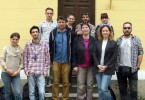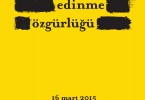Niyazi Dalyancı
“Yes, I do,” replied His All Holiness Bartholomeos, the Greek Orthodox Patriarch of Fener, to the U.S. television network CBS’s Bob Simon who asked him, “So do you feel crucified?” during an interview for the network’s “60 Minutes” news program with high ratings, drawing a harsh reaction from Ahmet Davutoglu, Turkey’s Foreign Minister.
During the interview Bartholomeos complained about the treatment his dwindling community in Turkey was receiving at the hands of the state and said that the Greek Orthodox citizens of the country were considered 2nd class by the authorities. Despite all his efforts and international pressure, the problems of the Greek Orthodox community in Turkey like reopening of the Halki Seminary to educate priests, remain unresolved, he said.
The interview was conducted in Turkey in April by Bob Simon and aired on Dec.21. by CBS. When the Turkish media picked up Bartholomeos’ comments, the resulting reaction was mixed. But the sharpest retort came from Davutoglu.
“In our historical tradition there has never been a crucifixion. The history of the Turkish nation is built upon religious tolerance,” Mr. Davutoglu claimed. “I don’t find this comparison compatible with the mature personality of the Patriarch,” said Mr. Davutoglu who found “crucifixion” an “extremely unfortunate comment,” which he hoped that it was “a slip of the tongue” on behalf of the Patriarch.
“If he has complaints we have appropriate authorities to which he could convey his complaints. We shall work on them and see what can be done. We cannot accept such comparisons that we do not deserve,” said Davutoglu.
“Turkish Republic does not evaluate its citizens according to their religious identity,” he added.
The regulations under which the Patriarchate functions were sealed in the Treaty of Lausanne in 1923 and they stipulate that all the patriarchs should have Turkish citizenship. However, with the Halki Seminary closed since 1971, the Greek Orthodox community of Istanbul that consists of couple of thousand people find it impossible to train Orthodox priests with Turkish citizenship. Bartholomeos voiced his concern that as the matter stands the Patriarchate would be “extinguished” in the near future.
Answering Bob Simon who asked him, “So why don’t you move to Greece?” Bartholomeos said, “This is our country. We love our country. We were born here and we want to die here. We feel that our mission is here as it has been for 17 entire centuries. I wonder why, the authorities of our country do not respect this history,” Bartholomeos replied.
“I have visited the prime minister and ministers many times, submitting our problems and asking for help,” says Bartholomeos, but no help came.
The main opposition Republican Peoples Party spokesman Onur Oymen also criticizes the comments by Bartholomeos. “The Patriarch is trying to show himself as suffering extreme pain. His comments about crucifixion is totally irrelevant, inappropriate and out of place,” said Oymen.
“Bravo to the Patriarch,” was the title of Hurriyet columnist Ahmet Hakan’s article on Sunday. Hakan congratulates the Patriarch for his open worded statement and writes, “Davutoglu said ‘I hope this was a slip of tongue. The disguised threat in Davutoglu’s comments show how justified Bartholomeos is in his words.”
Hurriyet’s columnist Sedat Ergin also criticized Davutoglu for ignoring the wrongdoings that Turkey’s minorities faced in the past.
“Taken literally, (that there is no practice of crucifixion) it may be accepted as correct. But metaphorically we see that innumerable practices and methods occupy a large part in our culture,” wrote Ergin. The columnist then lists the practices throughout Turkey’s recent history that victimized the minorities beginning with the “Wealth Tax” in 1942 that resulted in the expropriation of non-Muslim businessmen.






